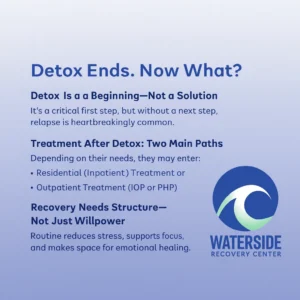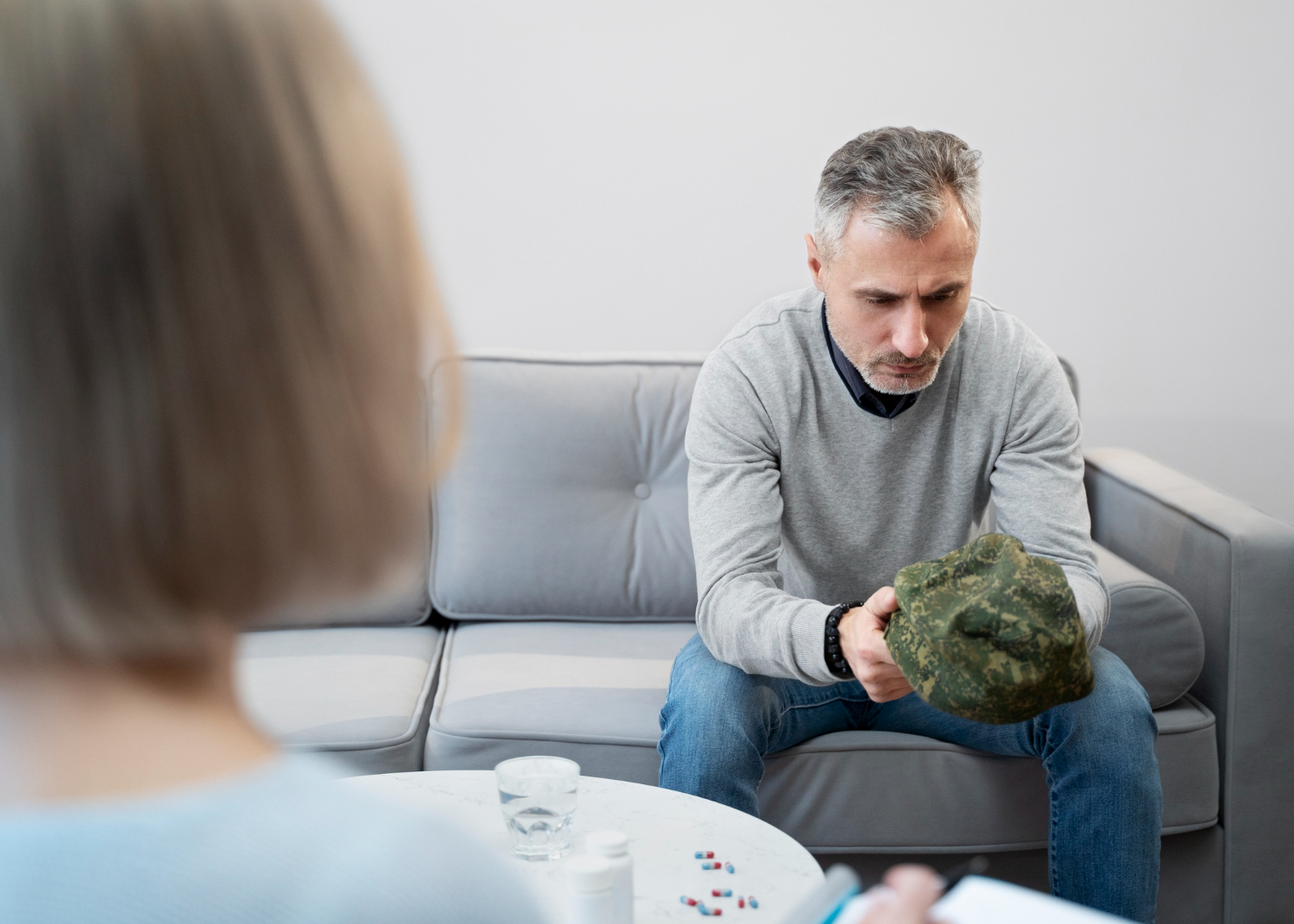When your child agrees to go to detox, it can feel like holding your breath—and finally exhaling.
But as that initial wave of relief passes, another feeling often moves in: uncertainty. Now what?
If you’re a parent of a 20-year-old who’s using again—or trying again—you’re not new to this. You’ve watched the cycle before. You’ve probably made the late-night phone calls, driven to the ER, fielded half-truths and broken promises. So when detox ends, you don’t just want to hope. You want to understand.
At Waterside Recovery, we help families in Plymouth County, MA, navigate these fragile in-between moments—where detox ends, but healing hasn’t fully begun. Here’s what happens next.
Detox Is a Beginning—Not a Solution
Let’s start with the truth: detox is about the body, not the brain.
It’s a short-term, medically supported process to safely clear substances from the system. This is a critical first step, especially for substances like alcohol, benzodiazepines, or opioids where withdrawal can be dangerous. But once detox is complete—usually in 3 to 10 days—your child isn’t “better.” They’re simply sober.
This is where many parents get blindsided. Detox can make it seem like the worst is over. Your child might sound clearer, more hopeful. But without a plan for what comes next, relapse is heartbreakingly common.
Real recovery starts after detox. And that next step matters more than most people realize.
Treatment After Detox: Two Main Paths
Once detox ends, your child will likely move into one of two types of drug addiction treatment programs:
1. Residential (Inpatient) Treatment
This is often the next step for someone who:
- Has a long history of substance use
- Lives in an unstable or triggering environment
- Needs 24/7 supervision and support
In a residential program, your child lives at the facility full-time. Their days are structured with therapy, groups, meals, recovery activities, and rest. The environment is designed to be safe, distraction-free, and deeply supportive.
2. Outpatient Treatment (IOP or PHP)
If your child has already completed inpatient treatment before—or if they have a strong support system and moderate clinical needs—they may step into:
- Partial Hospitalization (PHP): 5–6 days/week of structured treatment
- Intensive Outpatient Program (IOP): 3–5 days/week of group and individual sessions
Outpatient treatment allows for some flexibility while maintaining accountability and clinical care. Many families in Plymouth County or nearby Bristol County choose IOP or PHP to support continued recovery while rebuilding trust and life routines.
If you’re not sure which level is right, you don’t have to decide alone. A quality treatment center will help assess what makes sense—and explain why.
Why Therapy Is Non-Negotiable After Detox
Detox clears the body. But therapy helps your child figure out why they used, what they were avoiding, and how to live differently.
In treatment, your child will start to:
- Understand their triggers and cravings
- Process unresolved trauma, grief, or shame
- Learn to cope with emotional pain without numbing
- Rebuild identity, confidence, and relationships
This can be exhausting. Therapy doesn’t always feel good at first. Sometimes it stirs up more than it settles—but that’s a sign it’s working.
As a parent, it helps to remember: your child’s symptoms might get louder before they get clearer. That’s not failure. That’s healing, unfolding in real time.
Recovery Needs Structure—Not Just Willpower
One of the most overlooked aspects of post-detox recovery is routine.
For someone whose days were shaped around using, the silence of sobriety can feel terrifying. Treatment programs replace that chaos with a structured rhythm:
- Morning check-ins
- Therapy groups
- Skill-building workshops
- Healthy meals
- Movement or mindfulness activities
This structure isn’t just for organization—it’s a form of safety. When your child knows what to expect, it reduces stress, supports focus, and makes space for emotional healing.
You might notice that they start showing up differently—even in how they speak to you. The right structure creates the right soil. Growth takes time, but it can start here.
Family Involvement: Yes, You Still Matter
It’s easy to feel powerless as a parent, especially if this isn’t the first time through. But family involvement, when done with healthy boundaries, helps.
Many programs offer:
- Family therapy sessions
- Education groups for loved ones
- Support on setting boundaries that are firm, not punitive
You don’t have to fix this. You can’t. But you can be part of the healing process—by showing up, staying informed, and taking care of yourself along the way.

What Happens After Treatment Ends?
This is the other big unknown. And it’s where your fear likely spikes—what if they relapse again?
The truth is, many people do. Not because they’re weak, but because recovery is a skillset. And like any skill, it needs practice. Support doesn’t end when treatment does.
Aftercare services may include:
- Sober living: A substance-free home with accountability and peer support
- Alumni programs: Weekly check-ins, events, or recovery community groups
- Individual therapy: Ongoing support with the same or new clinician
- Relapse prevention planning: Tools and strategies to manage real-world stressors
Your child may need to try different combinations to find what works. It’s okay if it takes time. The goal isn’t perfection—it’s continued movement toward health.
A Word on Relapse (Even If You Don’t Want to Hear It)
Relapse doesn’t mean failure. It means something isn’t working yet.
It’s natural to feel disappointed or heartbroken if your child uses again. But shame won’t help them come back. What helps? Knowing the door is still open.
“He didn’t come back the first time. Or the second. But the third time, something shifted. He said he finally believed he was still worth helping.”
– Parent of a Waterside Recovery client
That’s the power of staying hopeful—not blindly, but bravely.
Drug Addiction Treatment in Plymouth County, MA
If you’re searching for drug addiction treatment in Plymouth County, MA, you’re not just looking for services. You’re looking for someone who gets it. Someone who understands that recovery is messy, grief-heavy, and sometimes starts with two steps back.
Waterside Recovery offers evidence-based, family-informed care that honors where your child is—and where they’re capable of going.
Our programs are built around:
- Clinical integrity
- Peer connection
- Family involvement
- Real-life readiness
You’re not alone. And your child hasn’t failed.
Not if they’re still here.
Not if you’re still reading.
FAQs: What Parents Ask Most After Detox
How long after detox should someone enter treatment?
Ideally, immediately. Gaps between detox and treatment increase the risk of relapse. Quality programs will help bridge that transition so there’s no lapse in care.
Is outpatient treatment enough after detox?
It can be, especially for individuals with some previous treatment experience or a stable living environment. But if your child is newly sober or in a high-risk environment, residential care may be safer.
What if my child refuses to go beyond detox?
That’s incredibly painful—but common. Some programs offer motivational support or intervention-style services to re-engage them. You can also attend family groups or therapy on your own. Your support matters, even if they’re not ready yet.
Will they be on medication after detox?
That depends on their needs. Some may receive medication-assisted treatment (MAT) for opioid or alcohol use. Others might need psychiatric medication for co-occurring mental health conditions. The key is a personalized, supervised plan.
How do I protect my own mental health during this?
By getting support for yourself. Therapy, family education groups, boundary-setting tools—all of these are for you, too. Loving someone in addiction is hard. You deserve care, not just your child.
Ready to understand the next step in your child’s healing?
Call us at (866)671-8620 to learn how Waterside Recovery supports families in Plymouth County, MA.
You don’t have to carry this alone anymore. And neither do they.


